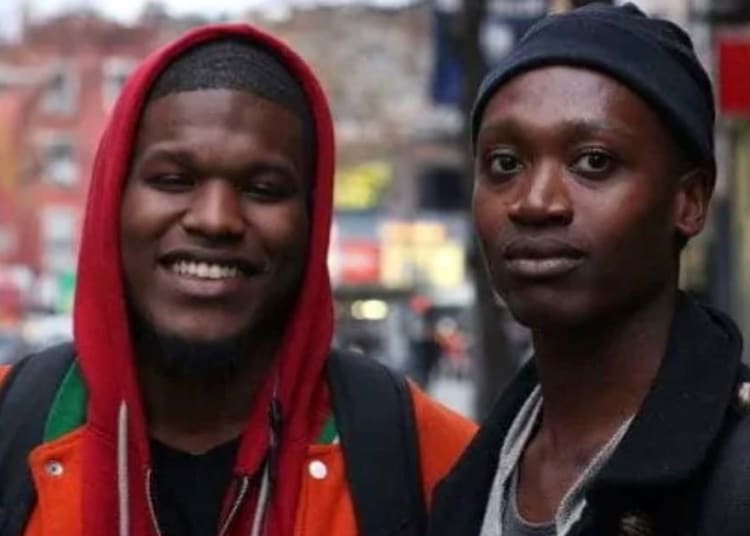
Photo credit: Andrew Prise. The two men in the photograph are Yale scholars who’ve featured in The Ordinary Genius Project
Black Son Parenting
The Anonymous Mama
Dear Reader: This post about raising a sheltered black son in a world filled with hate was written by our friend who we’ll call “The Anonymous Mama.” She’s a well-known writer but for this post, she wanted to go nameless. This post applies to any parents of a black kid. This angry world means all parents must have “the conversation” with what to do if the police stop you — and you are black.
My Sheltered Black Son
We were walking along the streets of Paris two years ago not too far from the Catacombs when I leaned down towards a man lying in the street and handed him a few Euros. My son, then 14, tapped me on my shoulder as we continued on our way and asked me: “Why is that man lying on the sidewalk like that?”
“Because he’s homeless,” I said. Then I froze. “You’ve never seen a homeless person before?”
He shook his head no. Then it hit me. Right, he hadn’t.
That’s because he’s grown up not far from Washington, D.C. in a suburban Virginia neighborhood populated with $300,000 homes that the mostly Asian population affectionately calls “Koreatown.” His upper-middle class playmates have mostly been the children of Tiger moms and Indians, Caucasians and just a smattering of African Americans. Some of his playdates have been in the million dollar mansions that populate our county.
See Also: Black Lives Matter
Sure, my son has been to DC. to the Smithsonian museums, the Zoo and the National Aquarium on field trips in the tourist areas along Constitution Avenue but those are areas where you don’t see the homeless. On weekends and for family gatherings we’ve traveled to Philadelphia. But my parents didn’t live in an area where there were homeless people, either.
He has lived his entire life in a single 15-20 mile radius brimming with gorgeous well-manicured lawns and neatly trimmed hedges and multi-colored flower beds and cherry blossom and dogwood trees. We’ve taken him to five countries and he has studied several languages. He excels in school and hopes to study psychology.
He has walked along leafy green streets filled with mostly late-model luxury cars owned by doctors, lawyers, educators, yuppies and soccer moms. Our neighbors, who are a diverse mix, all know each other and have watched him grow up. At night when we come in the house, the things I fear are not other people intending us harm, but frogs and snakes and skunks, and maybe the occasional fox.
In a world where another Black man seems to get shot by police every week and “Black Lives Matter” is either a call to unity or has undertones of racism, depending on which side of the fence you sit on, my ex-husband and I find ourselves in a unique dilemma: Have we done our sheltered child a disservice by living the American dream?
We’re raising a boy whose life doesn’t mirror the ones we see on television or in films. His is not the boy-in-the-hood childhood. But we’re sending him into a world where there are those who think because of his skin color he may have “violent tendencies.” Crime in my neighborhood consists mostly of teenagers being caught on camera stealing change from cars.
According to the crime index for my city, it’s safer than 64 percent of the cities in the U.S. And Neighborhood Scout.com states that the chance of becoming a victim of crime in my neighborhood is one in 1,739. Yet, I worry about my child. Should I be worried about his interactions with police? I don’t know. But given today’s climate I’m erring on the side of caution.
After years of telling him the police are who you turn to if there’s trouble, apparently now I have to include that caveat with “the conversation.” When we had “the conversation” … you know “the conversation” all black parents have with their sons, including Homeland Security Chief Jeh Johnson. Earlier this summer, on Meet the Press, Johnson said, my son looked at me with a blank stare.
That conversation includes how to behave around the police. Do EXACTLY what they say. Be polite. If you’re driving, keep your hands on the steering wheel. Don’t ask them questions. Make no sudden movements because they are afraid of your skin color—not you. (Which in itself is nonsensical). And if you are arrested “ask for an attorney” immediately and don’t make any statements without one present.
It scares me that I have to deal with this—on top of making sure he’s fed, clothed, educated and figuring out how to swing his college education. I never thought in 2016, with a sitting African American president that we would live in a world that STILL feels like 1955 if you are black.
_____________
Photo credit: Andrew Prise. The two men in the photograph are Yale scholars who’ve featured in The Ordinary Genius Project.


